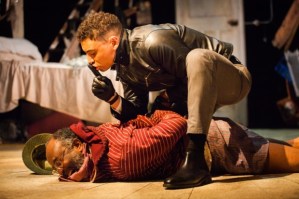Review: The Cherry Orchard (Bristol Old Vic)
Michael Boyd directs this co-production between Bristol Old Vic and the Manchester Royal Exchange
There’s an art to restoration, and Bristol Old Vic embodies it. Its refurbished gold-gilt Georgian auditorium is, at once, old and new. Its shape showcases its original form. There’s an exposed, grey brick wall – the theatre’s first frontage – and a paint job that shows off an old crack like a scar. The theatre itself is a new-minted antique: oddly old-fashioned yet in the finest of fettle.
Rory Mullarkey‘s translation of The Cherry Orchard feels exactly the same. The first British playwright to work from the Russian since Michael Frayn, 40 years ago, Mullarkey’s managed to both preserve Chekhov’s tone and to refresh it. Characters call one another by their proper Russian names, each a vocal gymnastics routine of its own, yet they also tell one another to "keep your mouth shut." The language flips from florid to forthright line by line. It’s a bit like seeing double: Chekhov’s play and Mullarkey’s translation, two things in one.
Theatre does that – duality is in its very DNA – and Michael Boyd’s elegant, minimalist production makes the most of it. It lives both here and now, and there and then, in our world and in Chekhov’s. Mullarkey draws out an abrupt old-school stage comedy – the whole thing begins with a squeaking shoe – that finds something of the Chuckle Brothers buried in Chekhov, but Tom Piper’s daredevil bare-stage design, which seats the audience onstage, has the theatre itself stand for the Ranevsky country home. Characters in period dress touch its walls fondly and admire its fittings, so when Simon Coates’ fuddy Gayev toasts the old bookshelf, he could just as well be cheering the building itself. Both things connect us to our cultural past.
Mullarkey’s translation drives at just that – the huge social changes overhauling old norms, both in 19th Century Russia and in our world, today. By casting black and mixed-race actors as Chekhov’s serfs, Boyd ties the emancipation of Russian peasants in 1861 to contemporary class shifts rooted in race. He shows us black men and women revelling in their rise as an old, white moneyed class feels the weight of its wane. So Julius D’Silva’s dishevelled doctor scrabbles around clearing his debts in black-tie, while Hayden McLean’s stand-offish Yasha grandly smokes cigars and swigs champagne.
Jude Owusu’s self-made, social-climbing Lopakhin gets it just right – a good man who grates. His tweed suit is too slick; his yellow shoes, too bright. Presenting his plan to save the estate, he holds himself like a hero – the Indiana Jones of middle-management – and he won’t let it go, every bit as insistent as a flashy Foxtons employee. To the refined Ranevskys, it’s all a bit brash, and when he buys the estate on which his ancestors slaved, his pride turns to something a little like spite.
As Madame Ranyevskaya, Kirsty Bushell is revelatory – not the usual frivolous, airheaded whoopsy, unwilling or unable to see the seriousness of her situation, but rather all too aware she’s caught in a bind. She gives money away not on a whim, but out of real empathy for those worse off than she was. Tragically, she can’t afford it, but nor does she care, stricken by grief. Between scenes, her young dead son stalks the stage – at one point soaked through as if freshly drowned. Every so often, Bushell catches sight of him and shivers or stops in her tracks.
There’s strong support all around her, as you’d expect from a champion of ensemble acting like Boyd. New Bristol Old Vic grads, Rosy McEwen and Verity Blyth are brilliant as the Ranevsky daughters, one austere, the other abandoned. Jack Monaghan brings a clownish, fumbling quality to the servant mockingly called Captain Catastrophe and Japanese actor Togo Igawa instils a kind of ancient dignity to the doddery old Firs. Beautifully judged and lovingly restored, let’s hope these Russophiles, Mullarkey and Boyd, do the whole Chekhov set.
The Cherry Orchard runs at the Bristol Old Vic until 7 April, then at Manchester Royal Exchange from 19 April to 19 May.
















